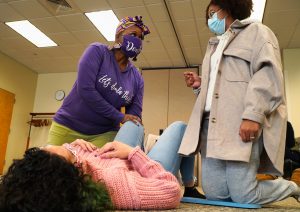Dr. Sharee Livingston is chair of Obstetrics and Gynecology at UPMC Lititz and a member of the board of directors for Patients R Waiting, a physician-led nonprofit that addresses health disparities by increasing diversity in medicine.

Dr. Sharee Livingston
One of the group’s programs, the Diversifying Doulas Initiative (DDI), has increased the number of Black and Brown certified doulas in the Lancaster area ninefold in the past year while providing free doula services to women of color.
Livingston explained how doulas help close the gap in health outcomes for Black mothers.
What is a doula and why are they important in addressing health disparities?
Livingston: A doula is a non-medical birth support — usually a woman, but it can be anyone.
I call doulas “A PIE in the Sky.” The “A” stands for advocacy, “P” for physical support, “I” for informational support and “E” for emotional support.
A significant amount of research shows doulas are wonderful for women who are socioeconomically challenged, alone, or managing social or substance abuse issues.
What piqued your interest in increasing the number of doulas, specifically Black doulas, in your area?
Livingston: I see a lot in the world of obstetrics. I see a ton of good, but I also see things that are not so good. We know that Black women are four to five times more likely to die in childbirth than their White counterparts, and that statistic should garner our attention.
We know that social determinants of health, including a lack of access to adequate health care, poor housing, food deserts, a lack of education, implicit bias and systemic racism, proliferate health disparities for people of color. I gained a passion for it because it was staring me in the face. I saw Black women dying during childbirth and it really shook me to the core. I said that this is my life’s work.
What are the benefits of including a doula in pregnancy, birth and postpartum care?
Livingston: At all points, but specifically postpartum, there’s a lot of data that shows postpartum depression, psychosis and anxiety are significantly decreased in women exposed to doulas.
In a 2013 study of just over 200 mostly African American women, 128 were not exposed to a doula while 97 were. The C-section rate was 24% for those not exposed to a doula and 19% for those exposed to a doula. That’s significant from a safety standpoint because we know vaginal birth is safer than a C-section.
The comparative analysis from that study showed women who did not have a doula had low birthweight babies at a rate of 8.6% compared to 2.1% for those with a doula. It tells you so much about the influence of a doula.
How are UPMC and Patients R Waiting working together to increase Black doulas in central Pennsylvania and making sure women who want a doula can access one?
Livingston: Eighteen women of color have completed our free DDI doula training program, and our spring cohort of 18 women will put us at a total of 36. That arm of our mission exploded — we had to shut it down because so many women were interested in becoming doulas.

Women participate in the free DDI doula training program.
We do a 16-week online training followed by three births and a hands-on training through Doulas of North America, the international certifying body. We are grateful to UPMC, which has provided us with the setting to safely — and COVID-19-consciously — do our hands-on training.
We have provided free birth and postpartum doula services to 50 women of color in Lancaster. Because we’ve received funding from UPMC, many of our providers who work with Diversifying Doulas will refer women to the Patients R Waiting website.
Once a woman completes an intake form on the website, it’s important for her to choose her own doula. We send patients a list of three certified doulas and she chooses the one she feels would fit her care model. We then connect them, and they form their relationship.
By the end of 2021, we hope to provide free doula services to 250 women of color in Lancaster. The usual cost for a doula is about $1,000, so it’s typically cost prohibitive for many women.
What is the relationship between physicians and health care systems and doulas?
Livingston: The relationship between doctors and doulas is enhancing. The more we can have a relationship, the more solid the care is for the patient. It is one-sided and shortsighted for us to think that the only avenue of excellent care for a pregnant woman is through an obstetrician. That could not be further from the truth. We recognize that there’s a team approach.








